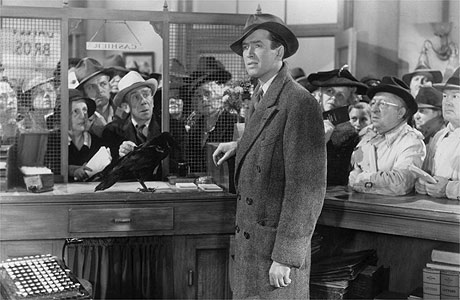
How do you respond when crisis comes to the team you lead?
I love the leadership displayed during a scene in “It’s a Wonderful Life” where George Bailey is about to leave for his honeymoon and panic struck the Building and Loan. As the president, he was forced to avert his plan, go back and save the company. He kept the Building and Loan open with a couple of dollars to spare. It was a tense moment. Everything they had worked for was at risk, but the crisis was solved — at least until the next crisis came.
This is the kind of time I’m referring to as a leader.
How do you respond?
There have been several times where it appeared everything was a loss on the team I was leading. I’ve experienced it in planning a single project, as well as with the entire company felt in jeopardy when I was a small business owner.
Crisis.
At the outset of a crisis, how should the leader respond?
The way the leader responds in crisis always dictates the way the team responds.
I must admit, I haven’t always handled these times as well as George Bailey, but experience has taught me a few things.
Here are 5 ways to respond at the outset of a crisis:
Slow down
The general tendency is to speed up, but “haste makes waste”. You need to move quickly, and sometimes you have to put out some initial flames, but as much as you can, slow down long enough to think before you react.
Don’t panic
You may indeed be in a panic on the inside, but your outer composure as a leader will set the thermostat of your team. The team’s emotions will almost always be an exaggerated version of the leader’s emotions. If you appear hopeless, the teams emotions will appear even more hopeless.
Get a plan
After you’ve addressed the most pressing needs — brought more of a sense of calm to the team — back away long enough to create a plan of recovery. It could be the best exit plan you can develop, but either way you need a plan. In crisis mode, this sometimes seems like a waste of time. The thought is often if the ship is sinking you just need everyone to help bail water. In my experience, however, getting a plan in place makes the difference in the quality of your leadership through the crisis. This probably requires pulling a team together to quickly brainstorm and strategize.
Navigate carefully
Once a plan is in place, you need to become an implementer of the plan. You’re the coach, cheerleader, captain of the ship at this point. You keep the team on task towards the end goal.
Help the team recover
After the dust settles from the crisis, the leader’s job isn’t complete until you help the team recover. This involves learning from what happened, making readjustments as needed, and helping the team begin again. In the best scenarios, this thought process begins to happen even during the crisis mode, giving the team some hope of better days to come.
We all hope to avoid those days of crisis on the team, but it helps to have a paradigm of how we should respond if or when they ever come.
Any thoughts you would add from your experience?








 Logging you in...
Logging you in...
 Loading IntenseDebate Comments...
Loading IntenseDebate Comments...
Some good advice Ron, everyone tends to rush and panic when a 'crisis' hits – not the way to handle it. Leaders tend to rush, under-react, leaving issues not addressed; or overreact and turn a molehill into an actual mountain of a 'crisis.' Mistakes WILL happen, operating as though they won't – that's Mistake #1. What we do to fix problems sometimes means more; good leaders know this. Point 3 is Key.
There should already BE a well considered, multi-varied Crisis Plan written and in place, revised and adapted as needed. It should include a range of incident and crisis response scenarios, as well as the corresponding Crisis Communications plan. It's the lack of this Plan that leads to the rushing, the panic, the other mistakes, as well as the breakdown in reviewing and accessing the success of the response, implementation of corrective measures. On that note, leaders also know that timing matters; rushing can be bad but you can't always wait for the 'perfect' solution.. in a crisis, sometimes done is better. FWIW.
Love it. Thanks.
Twitter: kmac4him
says:
Sometimes when a crisis hits, you try to just "go on as normal", but I feel that sometimes you have to sacrifice the "program" and deal with the damaged emotions at hand. A Crisis is not considered a normal thing. A crisis is a "God Interruption" and we need to "be" interrupted and give God time to make the necessary adjustments and let His purposes in play be worked out in lives. We usually say a person's lack of planning doesn't make it our emergency, but in a crisis we say: An emergency calls for a lack of planning and let's sit, let's not move, lets' wait on God. We had a youth pastor's little baby die suddenly and we stopped our "programs" and took two weeks of services to just grieve together and own each other's feelings, taking them to God and letting Him heal us.
Good word.
Great points Ron. I really like #1 & #2. Unless we need to give someone CPR it is best to take a deep breath, calm down and then make your plan. We need to resist the urge to just do something. – We need to do the right thing.
Amen. Thank you Jon.